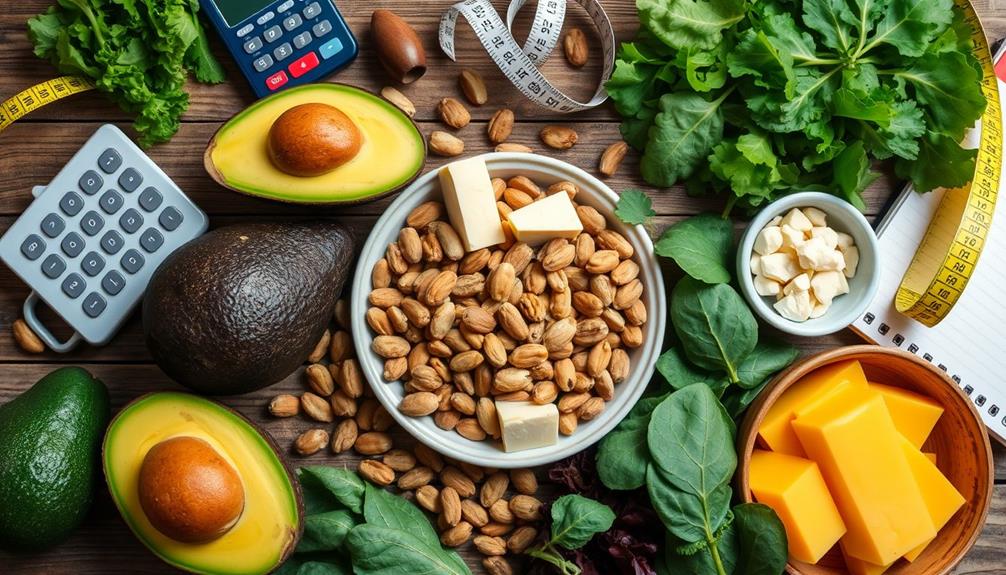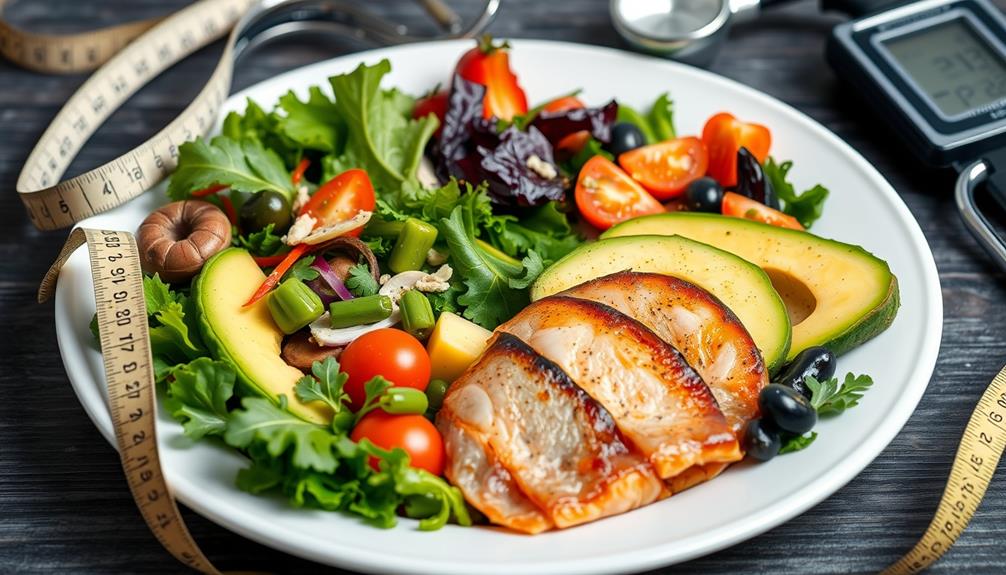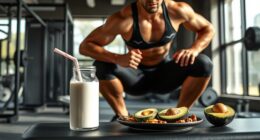Yes, you can drink alcohol on a keto diet, but you've got to choose wisely. Alcohol consumption can slow down ketosis, as your body prioritizes metabolizing alcohol over fat. Opt for low-carb options like clear spirits or dry wines to minimize carb intake. It's crucial to drink in moderation to avoid cravings for high-carb foods and potential hangovers. Keep an eye on your overall calories because alcohol adds empty calories that can stall your weight loss progress. Curious about the best drinks and tips for alcohol consumption on keto? There's more to uncover. To optimize alcohol consumption on keto, focus on lower-carb options like vodka soda, tequila with soda water and lime, or dry red or white wine. Keep in mind that mixers and chasers can also add carbs and calories, so opt for sugar-free mixers or simply enjoy your drink straight. Remember to stay hydrated and replenish electrolytes when drinking alcohol on keto, as it can lead to dehydration. It’s important to be mindful of your alcohol consumption on keto to maintain ketosis and continue progress towards your health and weight loss goals.
Key Takeaways
- Yes, you can drink alcohol on a keto diet, but moderation is key to maintain ketosis.
- Pure spirits and dry wines are the best options, containing minimal to no carbs.
- Alcohol metabolism can disrupt ketosis by slowing down fat burning and increasing cravings for carbs.
- Hydration is important; drink water before and after consuming alcohol to mitigate hangover effects.
- Limit intake to one drink per day for women and two for men to avoid health risks.
Overview of the Keto Diet
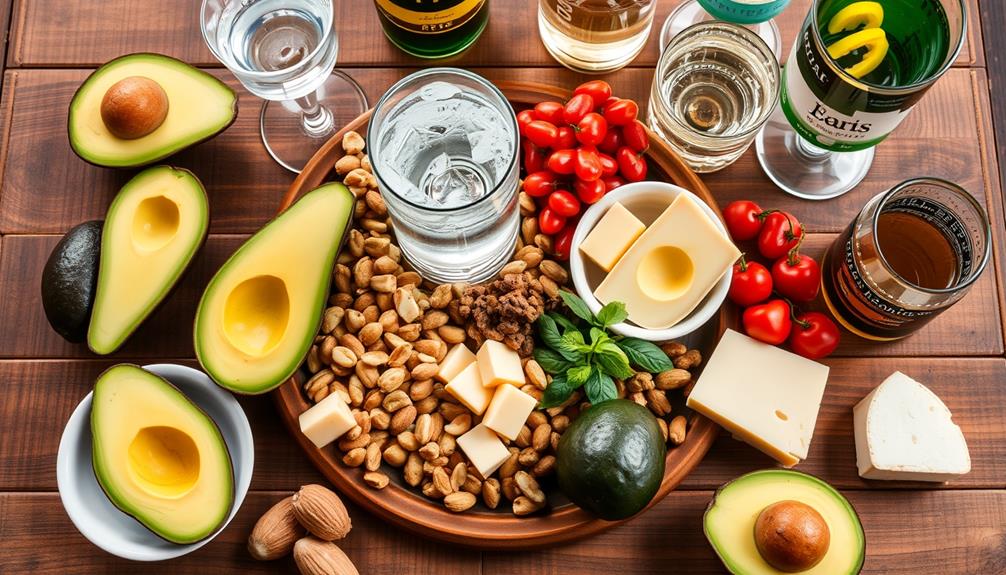
The ketogenic diet, often referred to as keto, is a low-carb, high-fat eating plan designed to shift your body into a state of ketosis. In this metabolic state, your body burns fat for energy instead of carbohydrates, which is a key benefit of the keto diet. Typically, you'll aim for a carb intake of about 30 grams per day, greatly reducing your carbohydrate consumption. This reduction leads to lower insulin levels and promotes fat burning.
Additionally, incorporating effective strategies for weight loss can enhance your overall results on the keto diet.
A well-formulated ketogenic diet includes moderate protein consumption along with a high intake of healthy fats. Balancing these macronutrients is vital for ideal results. While many people find that the keto diet helps with weight loss and enhances metabolic health, it's often recommended for short-term use.
Ideally, you should begin this dietary approach under the supervision of a healthcare professional or nutritionist.
It's also important to note that individuals on a ketogenic diet may have different levels of carbohydrate tolerance. To maintain ketosis and hit your dietary goals, consistent tracking of your food intake is essential.
Understanding these principles will help you navigate the keto journey effectively.
Alcohol and Ketosis

When you drink alcohol on a keto diet, your body prioritizes metabolizing it over producing ketones, which can slow down fat conversion.
This can lead to a scenario where individuals may need to reassess their investment goals regarding their overall health and fitness.
Additionally, you might feel the effects of alcohol more quickly and intensely due to lower carbohydrate levels.
It's essential to understand how this impacts your overall ketosis and alcohol tolerance.
Alcohol Metabolism Effects
During your keto journey, it's important to understand how alcohol metabolism can affect your state of ketosis. When you consume alcohol, your body prioritizes metabolizing it over fats, which can slow down ketone production. Alcohol is converted into acetate for energy, disrupting your fat-burning process and potentially complicating your ketosis.
Certain alcoholic beverages contain carbs and sugar, which can add to your total carb intake and may kick you out of ketosis. Additionally, if you're on a strict keto diet, you might notice decreased alcohol tolerance. With lower glycogen stores, you could become intoxicated more quickly and feel stronger effects from alcohol.
Here's a quick overview of how different alcohol types can impact your keto journey:
| Alcohol Type | Carbs (per serving) | Ketosis Impact |
|---|---|---|
| Light Beer | 3-7 grams | May disrupt ketosis |
| Wine (dry) | 0-4 grams | Minimal impact |
| Spirits (plain) | 0 grams | Generally safe |
| Sweetened Cocktails | 10+ grams | Likely to kick you out |
| Low-carb Beer | 2-4 grams | Better option for ketosis |
Understanding these effects can help you make informed choices while enjoying your social life.
Tolerance and Absorption Rates
On a ketogenic diet, your body's lower glycogen stores can considerably impact your alcohol tolerance and absorption rates.
With reduced carbohydrate intake, you may find that you feel the effects of alcohol more quickly than before. This happens because, in the absence of carbs, alcohol gets absorbed into your bloodstream faster, leading to quicker intoxication.
Additionally, it's vital to reflect on how certain foods and drinks can interact with your diet, such as cold medications which may also affect your overall health.
Since alcohol is metabolized as a toxin, your body prioritizes its processing over fats, which can disrupt your ketosis and slow down fat burning.
You might also experience stronger hangover symptoms due to this rapid absorption and the lack of carbohydrates that usually help buffer those effects.
Additionally, as your absorption rates increase, you could find that cravings for non-keto foods heighten after drinking. This could lead to impulsive eating decisions that derail your diet progress.
If you choose to indulge, sticking to keto-friendly drinks is essential.
Just remember that moderation is key, as your tolerance will be lower on this diet. So, whether it's a low-carb beer or a spirit with soda, be mindful of how these choices affect your overall keto journey.
Best Alcoholic Drinks

If you're following a keto diet and still want to enjoy a drink, there are plenty of low-carb options that won't derail your progress. Pure spirits like vodka, gin, tequila, and whiskey are excellent choices since they contain 0g of carbs per serving. This means you can sip on your favorite spirit without worrying about your carb intake.
Additionally, it's important to be mindful of your overall health, as certain beverages can have interactions with medications, similar to how cranberry juice consumption might affect those on blood thinners.
When it comes to dry wines, both red and white varieties typically have between 3.5 to 6 grams of carbs per 5-ounce glass. These can be enjoyed in moderation as part of your keto lifestyle.
If you prefer beer, light beers like Miller Lite and Corona Premier offer around 2 to 3.2 grams of carbs per 12-ounce serving, making them a decent option for occasional enjoyment.
For mixed drinks, you can create low-carb cocktails using diet mixers or soda water. Diet sodas contain about 1.04g of carbs per 12 oz serving, so they're a smart choice for mixing.
Just remember to check labels for hidden sugars in flavored drinks or cocktails, as they can often disrupt ketosis. Enjoy your drinks while staying on track with your keto goals!
Worst Alcoholic Drinks
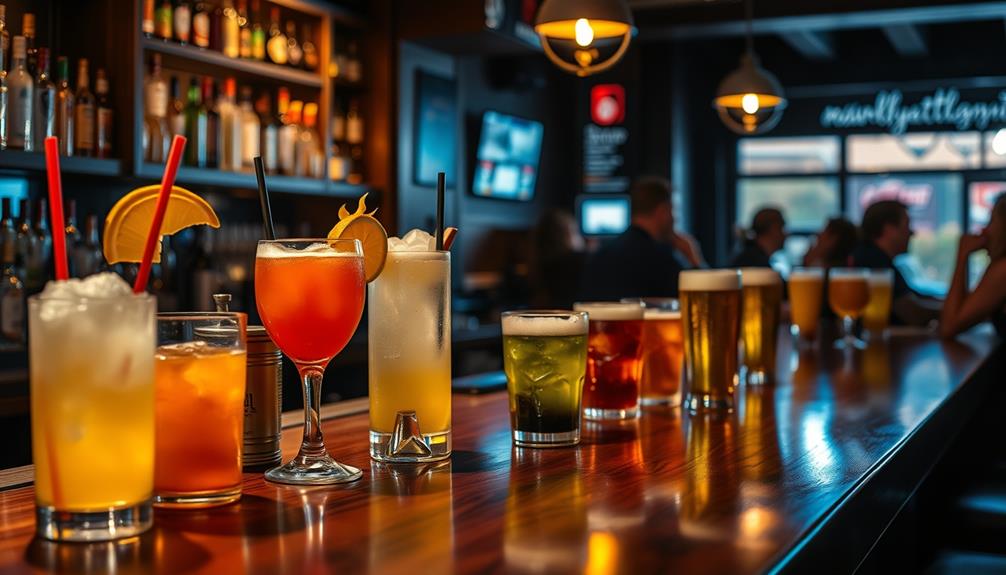
While there are plenty of low-carb options for enjoying a drink on a keto diet, some alcoholic beverages can quickly sabotage your efforts. It's crucial to avoid those that are high in carbs and sugar, as they can derail your progress. Here's a list of the worst alcoholic drinks you should steer clear of:
| Drink | Carbs per Serving |
|---|---|
| Piña Colada | 25.35g (4.3 oz) |
| Margarita | 19.32g (4 oz) |
| Whiskey Sour | 14.49g (3 oz) |
| Regular Beer | 12g (12 oz) |
| Sweet/Dessert Wine | 10g+ (varies) |
These drinks are not just high in carbs; they often contain hidden sugars that make them particularly detrimental for someone on a low-carb diet. Cocktails mixed with sodas or juices can also sneak in extra carbs you might not expect. By avoiding these worst alcoholic drinks, you can maintain a better grip on your keto goals and keep your carb intake in check.
Effects of Alcohol on Ketosis

When you drink alcohol on a keto diet, it can disrupt your ketosis by making your liver prioritize alcohol metabolism over fat burning.
This shift not only slows down ketone production but can also increase cravings for carbs, making it tougher to stick to your diet.
Additionally, understanding risks and rewards of Bitcoin IRAs can be useful as you navigate financial decisions, including dietary choices that may impact your budget.
Plus, you might find that your alcohol tolerance changes, leading to quicker intoxication due to lower glycogen stores.
Alcohol Metabolism and Ketosis
Alcohol metabolism substantially impacts ketosis, as the liver prioritizes the processing of ethanol over fat. When you consume alcohol, your body treats it as a toxin, which can temporarily halt ketone production and slow down your rate of ketosis. While drinking doesn't stop ketosis completely, it can hinder your progress by affecting how quickly you generate ketones from fats.
Here's a quick overview of how alcohol impacts your keto journey:
| Effect | Details |
|---|---|
| Metabolism Priority | Ethanol is processed before fats |
| Ketone Production | Slows down during alcohol processing |
| Alcohol Tolerance | Decreased due to lower glycogen stores |
| Cravings | Increases cravings for non-keto foods |
| Impulsivity | Lowers social inhibitions, leading to poor choices |
Understanding these effects can help you make informed decisions about alcohol on your keto diet. You might find that moderation is key, as excessive drinking can lead to cravings and derail your keto goals.
Impact on Fat Burning
Consuming alcohol can markedly disrupt your body's ability to burn fat effectively. When you drink, your liver prioritizes metabolizing alcohol over converting fats into ketones for energy. This means that while your body processes the alcohol, fat burning takes a backseat, leading to a temporary halt in ketosis.
Alcohol is treated as a toxin, causing a metabolic delay that can hinder your weight loss efforts. Individuals with BPD often experience intense emotional responses, which can complicate their relationship with food and alcohol, making it essential to understand these dynamics.
Even moderate drinking can slow down the rate of ketone production and fat utilization. This slowdown may not stop ketosis entirely, but it can make achieving your fat-burning goals more challenging.
Additionally, excessive alcohol intake often leads to cravings for carbohydrates, which can further disrupt ketosis and throw you off track.
It's also important to note that drinking alcohol on a keto diet can result in faster intoxication due to your reduced glycogen stores. This lower alcohol tolerance can make it easier to overindulge, compounding the negative effects on your fat burning.
Alcohol Tolerance Variability
Experiencing lower alcohol tolerance while on a ketogenic diet can lead to quicker intoxication and heightened effects from drinking. This is largely due to the reduced glycogen stores in your body, which affects how alcohol is processed.
When you're on a keto diet, the absence of carbohydrates allows alcohol to be absorbed into your bloodstream more rapidly, intensifying its impact. Additionally, maintaining overall health is essential, and incorporating practices like using essential oils for stress relief can be beneficial during this time essential oils for relaxation.
Here are three key points to remember:
- Increased Intoxication: You might find yourself feeling the effects of alcohol much sooner than you expect, so proceed with caution.
- Slower Ketosis: Alcohol metabolism takes precedence over fat metabolism in your liver, which can slow down your ketosis process.
- Worse Hangovers: If you do indulge, be prepared for potentially more intense hangover symptoms due to dehydration and the effects of low carb intake.
Tips for Drinking on Keto

Maneuvering social situations while following a keto diet can be challenging, especially when it comes to drinking. To stay on track, limit your alcohol consumption to one drink per day for women and two for men. This helps minimize the risk of derailing your ketosis and affecting your overall health.
When choosing alcohol options, opt for low-carb choices like clear spirits—vodka, gin, or tequila—and dry wines, which usually contain fewer than 6g of carbs per 5 oz serving. Additionally, understanding the different brewing methods can complement your keto lifestyle by allowing you to create low-carb coffee cocktails that fit within your dietary goals.
Hydration is key, so drink water before and after consuming alcohol to combat dehydration, a common issue on a keto diet. Be cautious with mixers; sugary cocktails can spike your carb intake. Instead, stick to diet soda or soda water to keep your drink low-carb.
Lastly, keeping a food diary can be beneficial. Track your alcohol consumption and its effects on your ketosis to better understand how it influences your dietary goals.
Low-Carb Alcoholic Options

If you're looking to enjoy a drink while sticking to your keto diet, there are plenty of low-carb options available.
Pure spirits like vodka and whiskey have zero carbs, making them perfect for your lifestyle.
Additionally, incorporating some investment strategies in precious metals could help you manage your finances while enjoying those drinks.
You can also choose dry wines or light beers to keep your carb count in check without sacrificing flavor.
Best Low-Carb Spirits
When it comes to enjoying a drink on a keto diet, choosing the right spirits is essential for keeping your carb count low.
Fortunately, many plain spirits are excellent low-carb options that allow you to indulge without guilt. As with coffee, understanding the flavors and profiles of your spirits can enhance your enjoyment, similar to how one explores numerous varieties available in coffee.
Here are three top choices for your next drink:
- Vodka: With 0g of carbs, vodka is a versatile spirit perfect for mixing with zero-carb mixers like soda water or diet soda.
- Gin: Another carb-free option, gin adds a botanical twist to cocktails while keeping your carb content in check.
- Tequila: Enjoy tequila straight or in a low-carb cocktail; it also boasts a carb content of 0g.
When you're on a keto diet, sticking to these low-carb alcoholic drinks can help you maintain ketosis.
Just remember to avoid sweet wines and sugary mixers, as they can greatly increase the carb content and disrupt your progress.
Keto-Friendly Wine Choices
After exploring low-carb spirits, it's time to contemplate wine options that fit your keto lifestyle. When it comes to keto-friendly wine choices, dry wines are your best bet.
Red wines like Cabernet Sauvignon and white wines such as Chardonnay typically contain between 3.5 to 6 grams of carbs per 5-ounce serving, making them suitable for your low-carb diet.
If you're in the mood for bubbles, look for brut varieties of Champagne and sparkling wines, which usually contain around 1.5 to 3 grams of carbs per 5-ounce glass.
However, steer clear of sweet wines like Riesling or dessert wines, as they can pack in over 20 grams of carbs per serving, which could disrupt your ketosis.
For the best experience, consider choosing organic or natural wines. These often have lower sugar content due to minimal intervention during fermentation.
You can also look for wine brands specifically labeled as "low-carb" or "keto-friendly," as they typically provide clear carb counts on their labels, making it easier for you to keep track of your intake.
Enjoying wine while staying on keto is possible with the right choices!
Alcohol Metabolism and Weight Loss
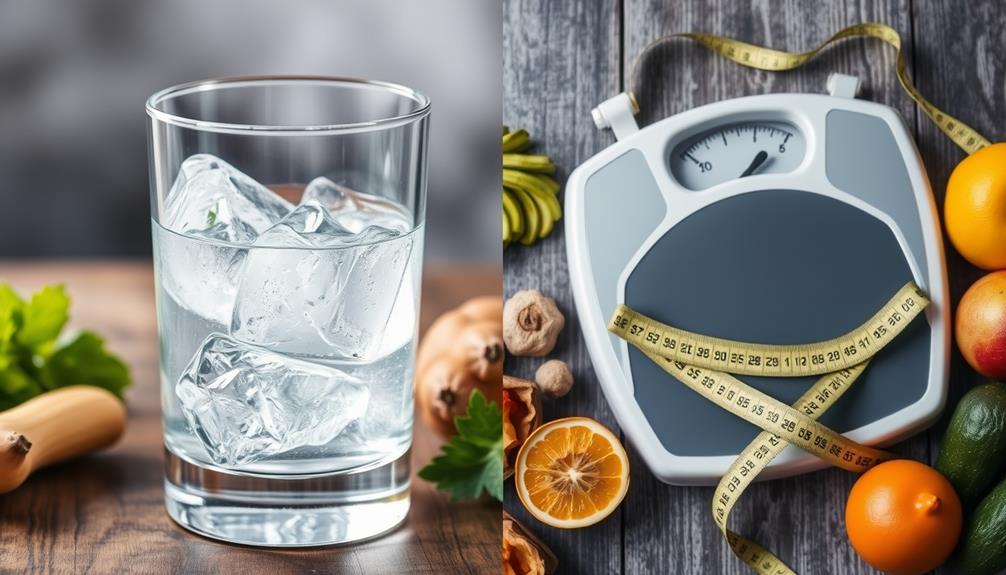
Alcohol can greatly impact your weight loss journey on a keto diet. Understanding how alcohol metabolism works is essential for staying on track. When you drink, your liver prioritizes breaking down alcohol over processing fats, which can temporarily halt fat metabolism during ketosis. This can slow down your weight loss efforts.
Here are three key points to take into account:
- Caloric Surplus: Alcohol contains empty calories that can contribute to a caloric surplus, making it harder to lose weight even on a low-carb diet.
- Cravings: Excessive alcohol intake can increase cravings for high-carb foods, leading to poor dietary choices that disrupt your keto goals.
- Lower Tolerance: On a keto diet, you might experience lower alcohol tolerance due to reduced glycogen stores, intensifying the effects of alcohol and affecting your decision-making around food.
Alcohol Tolerance on Keto

Many people on a keto diet find they've a notably lower alcohol tolerance compared to when they consumed more carbohydrates. This happens because following a keto diet reduces glycogen stores, leading to faster alcohol absorption into your bloodstream.
In ketosis, your body prioritizes the metabolism of alcohol over fat, which means you might feel the effects of alcohol more intensely and quickly.
Studies indicate that individuals on a strict lower carb diet often require smaller quantities of alcohol to achieve the same level of intoxication they once experienced on a higher-carb diet. This change can result in quicker intoxication and more severe hangovers, as your body's ability to process alcohol is altered in ketosis.
Being aware of your personal alcohol tolerance becomes essential when you're on a keto diet. You're likely to find that your tolerance has markedly decreased, so it's wise to approach alcohol consumption with caution.
Health Risks of Daily Drinking

While enjoying a drink might seem harmless, daily alcohol consumption poses significant health risks that can undermine your well-being.
Even if you're on a high-fat diet like keto, regular drinking can lead to serious health conditions you should be aware of.
Here are three major risks associated with daily drinking:
- Increased Health Issues: Consuming alcohol daily raises your risk for liver disease, cardiovascular problems, and certain cancers, especially if you exceed recommended limits.
- Weight Gain: Drinking two or more alcoholic beverages daily can lead to significant weight gain over time. This can counteract your keto goals, as those empty calories add up and can stall your progress.
- Nutrient Deficiencies: Alcohol provides empty calories without any essential nutrients, impairing the absorption of vitamins and minerals. This can lead to deficiencies that affect your overall health.
Moreover, regular drinking can increase the risk of alcohol dependence, impacting your mental health and making it harder to stick to your dietary changes.
It's essential to be mindful of these risks if you're considering daily drinking while on the keto diet.
Frequently Asked Questions
What Alcohol Is Ok on Keto?
When choosing alcohol on keto, opt for pure spirits like vodka or gin, dry wines, and light beers. Avoid sugary cocktails and sweet wines, as they can disrupt your carb count and ketosis. Enjoy responsibly!
Does Alcohol Kick You Out of Ketosis?
You might think alcohol always disrupts ketosis, but it doesn't necessarily kick you out. It can slow ketone production instead. Pay attention to how your body reacts and choose wisely to minimize any impact.
Can I Drink a Whole Bottle of Wine on Keto?
Drinking a whole bottle of wine isn't wise on keto. It'll likely exceed your carb limit, disrupting ketosis and slowing your weight loss. Stick to one glass to enjoy without setbacks. Moderation's key!
Can You Drink Coke Zero on Keto?
Yes, you can drink Coke Zero on keto since it contains no carbs or calories. Just remember to consume it in moderation, as too much might trigger cravings or cause digestive issues for some individuals.
Conclusion
In summary, you can enjoy alcohol while on a keto diet, but it's essential to choose wisely. Opt for low-carb options to keep your ketosis intact. Remember, moderation is key—how often are you willing to sacrifice your progress for a drink? Be mindful of how alcohol affects your body and weight loss journey. By making informed choices, you can still indulge without derailing your keto goals. Cheers to smarter sipping!


